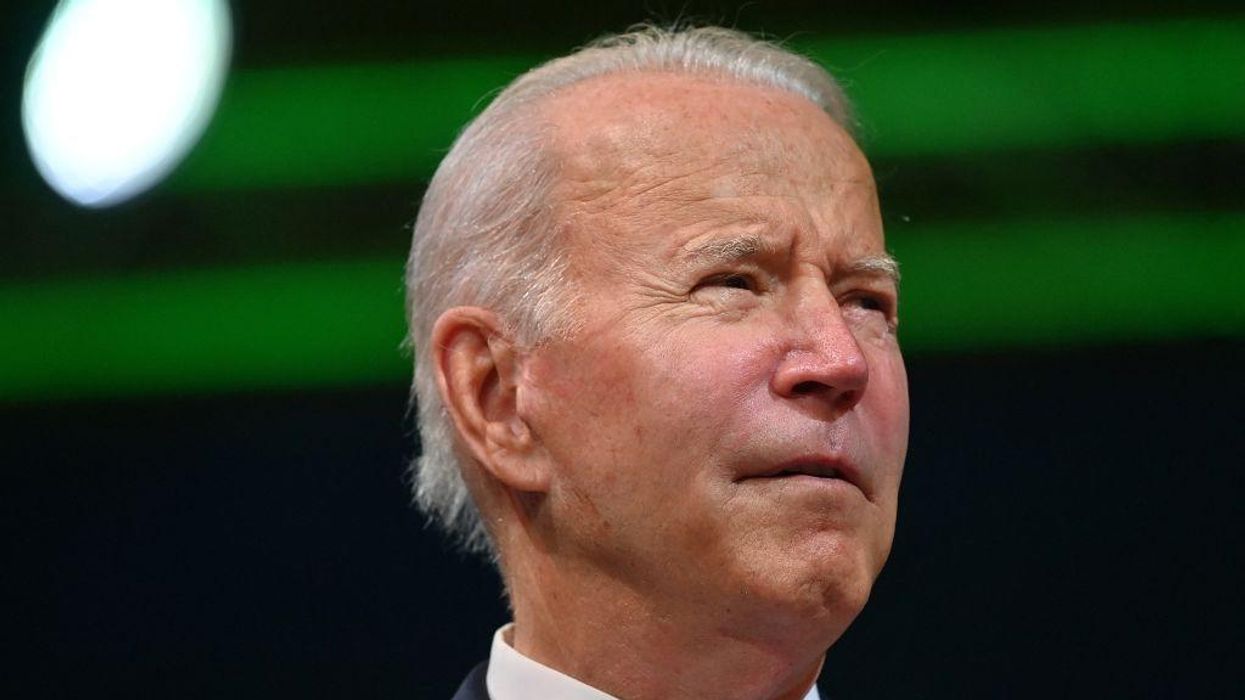
Photo by PAUL ELLIS/POOL/AFP via Getty Images

To satisfy climate alarmists' desire that American streets be crowded only with so-called zero-emission vehicles, rare earth minerals must be extracted. The Biden administration, caving to pressure from activist groups, would prefer those minerals to be largely sourced abroad, where regulations are lax and potential environmental consequences are out of the American public's view.
Axios reported that the Biden administration is not just seeking to acquire lithium, cobalt, copper, nickel, and other resources required in the manufacture of EVs from outside the U.S. but is seeking to help finance foreign mining projects with federal funds.
Jose Fernandez, undersecretary of state for economic growth, energy, and the environment, told Axios that the Biden administration is considering funneling federal funds into "around a dozen" mining projects outside of the U.S., potentially through the Mineral Security Partnership.
The MSP was established in June to "ensure that critical minerals are produced, processed, and recycled in a manner that supports the ability of countries to realize the full economic development benefit of their geological endowments."
The end use of these "critical minerals" are so-called clean technologies like EVs and solar panels.
Among the MSP's member states are Australia, Canada, Finland, France, Germany, Korea, the U.K., and the U.S.
MSP partners are poised to provide projects around the world with debt financing, guaranteed loans, and other forms of financial support in hopes of increasing and securing stable supply of critical minerals while also limiting reliance on Chinese resources.
According to Axios, federal funds will be made available through the Export-Import Bank and the Development Finance Corporation, which is already backing a Brazilian nickel mining project.
Fernandez suggested that "we're going to need an exponential amount of rare earths and critical minerals, above what we have today."
To that end, the Biden administration will raise "the level of investment ... in a way that benefits these countries and would be sustainable."
Since President Joe Biden took office, he has been under immense pressure from environmentalist groups to kill domestic mining projects.
Biden's Department of the Interior killed two mineral leases for Antofagasta Plc's Twin Metals copper and nickel mine in Minnesota back in January.
Biden also caved to a demand by Rep. Raúl Grijalva (D-Ariz.) and others to block a federal land exchange for the Rio Tinto/BHP Group Resolution joint venture, which planned to produce an estimated 40 billion pounds of copper over a 40-year stretch.
Concerning the administration's capture by climate activists, Rep. Lauren Boebert (R-Colo.) said, "These 'not-in-my-backyard' extremists have made clear they want to lock up our land and prevent the mining of minerals."
Having locked up American resources, the Biden administration has sought to furnish environmentalists' dream of a greener America with foreign minerals, reported Reuters.
While some of these minerals will be sourced from Canada — a USMCA nation that shares with America an integrated electricity grid, the world's only binational military command, and similar regulatory standards — the Biden administration and the MSP apparently won't hesitate to aid projects in compromised nations farther abroad.
For instance, at the ministerial meeting of the MSP in September, Secretary of State Antony Blinken cited a graphite mine in Balama, Mozambique, as an MSP success story. Blinken suggested that local conflict in the human rights-challenged nation was averted by employing hundreds of local workers in the mine and raising millions of dollars in community development.
Deantha Skibinski, executive director of the Alaska Miners Association, told Alaska Business that it need not be an either/or decision but that American projects should nevertheless be prioritized.
"Production of minerals from allied nations isn’t necessarily a bad thing, as the projections on demand are so staggering it really may be an ‘anywhere we can get supply’ situation," said Skibinski, "but we should look to produce minerals in America first, where we know that mining is conducted with the highest environmental, labor, and safety standards in the world, and the economic and community benefits can be realized by our citizens."
Rep. Bruce Westerman (R-Ark.) similarly noted that "we need to be forming alliances with our friends around the world,” but funding foreign projects at Americans' expense and disadvantage was “horrific.”
Axios indicated that Republicans like Westerman are not particularly keen on funneling taxpayer funds via multinational groups to foreign powers with dubious labor, environmental, and regulatory records.
Instead, upon assuming control of Congress in the new year, House Republicans intend to help boost American production of lithium, copper and other EV materials.
Westerman said, "We need to step up our mining activities if we're going to have an electrified economy."
Reuters reported that GOP leaders have also promised to cut the mining permit review timeline in half.
In addition to supporting American mineral extraction and refinement, Republicans are also setting about addressing the Biden administration's war on domestic mineral extraction.
A GOP aide to the House Foreign Affairs Committee told Axios, "As soon as we get into the majority, we will be getting pretty deep into it."